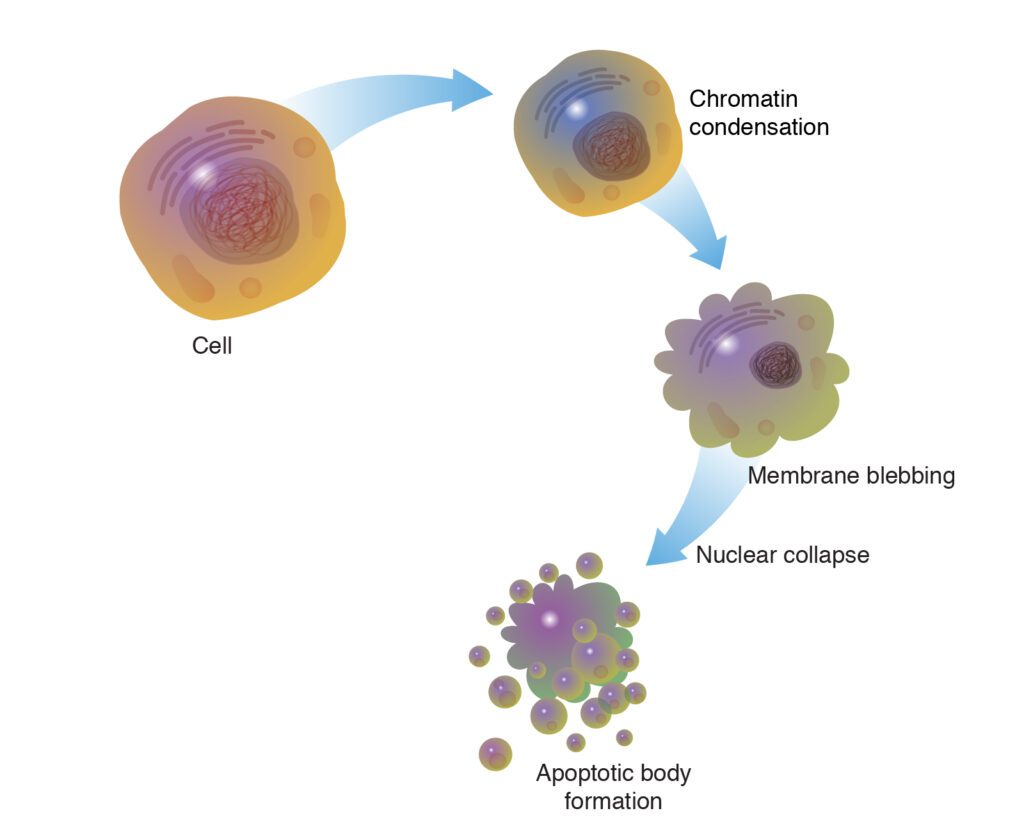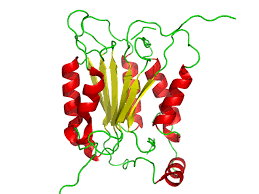What do you mean by Apoptosis?

The process of planned cell death is called apoptosis. It is applied in the early stages of development to get rid of undesirable cells, like the ones that grow between a developing hand’s fingers. Adults employ apo to get rid of cells that are too damaged to be repaired. Another function of apoptosis is to prevent cancer.
Envision a busy metropolis where structures are always being built, refurbished, and torn down. Our bodies need a similar balance to operate properly—the regulated elimination of old, damaged, or useless cells. This is analogous to how a city requires a balance of new and old buildings. This process, called apoptosis, is essential to our survival, growth, and well-being.
It is a closely controlled process that culminates in the death of the cell, much like a professionally performed ballet. While necrosis is an untidy, uncontrollably dying process brought on by an external lesion, It is a neat, orderly process that does the least amount of harm to neighboring cells. Imagine it as the cell making place for new musicians by politely bowing and leaving the stage.
Table of Contents
Why does apoptosis matter?
Development: Picture a skilled sculptor removing extra stone piece by piece to unveil a work of art. Similar to how apo shapes our organs and eliminates extra cells during embryonic development, it also plays a function in designing our bodies. It is essential for correct organ development, brain morphology, and the formation of fingers and toes.
Tissue homeostasis: New cells replace aging or damaged ones as a part of our body’s ongoing renewal process. By eliminating cells that are no longer required or that have malfunctioned, it preserves this delicate equilibrium. It keeps unchecked cell proliferation at bay, maintaining the health and functionality of our tissues.
Protection against illness: One of the most important tools in our immune system’s toolbox. It gets rid of malignant or diseased cells, stopping them from growing and doing further harm.
How is apoptosis carried out?
A number of sophisticated molecular stages are involved in the complex process of apo . Among the important participants are:
Caspases

Caspases are enzymes that break down cells from the inside out, much like executioners. The way they are triggered is like to a series of dominoes falling one after the other in a cascade.
Mitochondria
These cellular powerhouses have the ability to produce cytochrome c, a crucial chemical that sets off the caspase cascade and starts it .
DNA fragmentation
It occurs, the cell’s DNA is broken up into tiny pieces to stop potentially hazardous genetic material from being passed on.
Cell shrinkage and fragmentation
The cell becomes smaller, loses its normal volume, and finally disintegrates into apoptotic bodies, which are tiny, membrane-bound vesicles. Neighboring cells subsequently consume these entities, halting inflammation and tissue damage.
Why does apoptosis occur?
Both internal and external cues have the ability to initiate apoptosis:
Internal signals: Internal signals include misfolded proteins, DNA damage, and internal stress brought on by a deficiency of nutrition or growth hormones.
External signals: These include radiation, poisons, and immune system signals.
Disease and apoptosis
Although It is essential for avoiding illness, errors may lead to a number of health issues, including:
Cancer: Carcinogenic cells have the ability to evade planned death and proliferate uncontrolled if it is compromised.
Neurodegenerative disorders: In conditions like Parkinson’s and Alzheimer’s, it plays a role in the death of neurons.
Autoimmune illnesses: Unchecked apoptosis may cause healthy tissues to be destroyed, which exacerbates autoimmune diseases.
Recognizing apoptosis
Scientists are advancing the development of novel illness remedies by researching it. Among them are:
Cancer therapy: Researchers are looking for methods to cause cancer cells to undergo apoptosis, which would destroy the cancer cells alone, sparing healthy ones.
Neuroprotective therapies: Researchers are looking at neuroprotective medicines as a means of delaying or preventing neuronal death in neurodegenerative illnesses.
Tissue regeneration: Gaining insight into apoptosis is essential to creating strategies for regenerating organs and tissues, which may result in novel treatments for illnesses and wounds.
In summary
Apoptosis is an important and intriguing process that reveals the sophisticated and intricate systems that operate within our cells. Gaining knowledge of this intricate waltz between life and death might help us better comprehend how our bodies function and perhaps even lead to the development of novel treatments for illnesses. We are laying the foundation for a better, healthier future as we continue to solve the riddles of apoptosis.
Frequently Asked Questions(FAQ)
What do you mean by genetics?
The study of genes, heredity, and genetic diversity in living things is known as genetics. It investigates the processes underlying the transmission of qualities from parents to children as well as the influence of genetic variations on an individual’s features.
Define Neurodegenerative?
The term “neurodegenerative” describes a class of illnesses that gradually weaken and destroy nerve cells, or neurons, in the brain and other nervous system organs.
Related Articles

